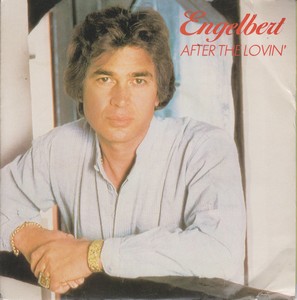
Gordon William Mills was a successful London-based music industry manager and songwriter. He was born in Madras, British India and grew up in Trealaw in the Rhondda Valley, South Wales. During the 1960s and 1970s, he managed the careers of three highly successful musical artists - Tom Jones, Engelbert Humperdinck and Gilbert O'Sullivan. Mills was also a songwriter, penning hits for Cliff Richard, Johnny Kidd & the Pirates, Freddie and the Dreamers, The Applejacks, Paul Jones, Peter and Gordon and Tom Jones, most notably co-writing Jones's signature song "It's Not Unusual" with Les Reed.

Christopher Niles Cox is an American dance music producer, remixer, and DJ who has worked on over 600 records throughout his career. His album 12 Inches of Cox was released in 2002.

Charles Calello is an American arranger, composer, conductor, record producer, and singer born in Newark, New Jersey. Calello attended Newark Arts High School and the Manhattan School of Music, in New York City. His track record of successfully collaborating with various artists to produce or arrange Billboard hit songs led to his nickname in the industry as the "Hit Man."

Arnold George Dorsey, known professionally as Engelbert Humperdinck, is a British pop singer described by AllMusic as "one of the finest middle-of-the-road balladeers around". He achieved international prominence in 1967 with his recording of "Release Me".

"After the Lovin'" is a single performed by Engelbert Humperdinck, produced by Joel Diamond and Charlie Calello, and composed by Ritchie Adams with lyrics by Alan Bernstein. The single was a U.S. top-ten hit in late 1976/early 1977, reaching number eight on the Billboard Hot 100 and number five on the Cash Box Top 100. It became a RIAA gold record. It is ranked as the 61st biggest U.S. hit of 1977. The song also reached number 40 on the country singles chart and spent two weeks atop the easy listening chart. It was Humperdinck's final Top 40 Billboard hit.

"The Last Waltz" is a ballad, written by Barry Mason and Les Reed. It was one of Engelbert Humperdinck's biggest hits, spending five weeks at number 1 on the UK Singles Chart, from September 1967 to October 1967, and has since sold over 1.17 million copies in the United Kingdom.
"Release Me" is a popular song written by Eddie Miller and Robert Yount in 1949. Four years later it was recorded by Jimmy Heap & the Melody Masters, and with even better success by Patti Page (1954), Ray Price (1954), and Kitty Wells (1954). Jivin' Gene [Bourgeois] & the Jokers recorded the tune in 1960, and that version served as an inspiration for Little Esther Phillips, who reached number one on the R&B chart and number eight on the pop chart with her big-selling cover. The Everly Brothers followed in 1963, along with Lucille Starr including a translation in French (1964), Jerry Wallace (1966), Dean Martin (1967), and Engelbert Humperdinck (1967), whose version reached number one on the UK Singles Chart.
John Stanley Livingstone Harris was a Scottish composer, producer, arranger, conductor, and musical director. He lived in the United States from 1972 until his death.
"Am I That Easy to Forget" is a popular song written by country music singer Carl Belew and W.S. Stevenson and published in 1958. Belew recorded his song in Nashville on December 17, 1958, and released the single in March 1959, when it reached number nine on the U.S. country music chart. Other country music artists who have recorded cover versions of the song include Skeeter Davis, Ernest Tubb (1960), Jerry Wallace (1962), Gene Vincent (1966), George Jones (1967), Patti Page (1968), Ann-Margret & Lee Hazlewood (1969), Jim Reeves and Prairie Oyster (1991).

Engelbert Humperdinck was a German composer. He is known widely for his opera Hansel and Gretel (1893).

This is the discography of the British singer Engelbert Humperdinck who made his professional debut in 1967.
Martin Terefe is a Swedish record producer and songwriter, now living and working in London, who has produced Grammy, Brit and Juno award -winning albums with artists like Jason Mraz, James Morrison and KT Tunstall. He is also a member of the group Apparatjik.
"Les Bicyclettes de Belsize" is a song written and composed by Les Reed and Barry Mason. Used as the theme song of the 1968 eponymous musical film, it was mimed by Anthony May in the movie and sung by Johnny Worth. As a 7" 45rpm single, it was a big hit that year, in parallel English and French versions, for Engelbert Humperdinck and Mireille Mathieu, respectively. The French version premiered on Mathieu's 1968 Columbia album Les Bicyclettes de Belsize; the English version premiered as a single in 1968, and was then included on Humperdinck's 1969 album Engelbert.
Richard Adam Ziegler, known professionally as Ritchie Adams, was an American singer and songwriter.

"I Can't Live a Dream" is a 1976 single by The Osmonds as the first track on their Brainstorm LP..

Engelbert Humperdinck is an album released in 1969 by Engelbert Humperdinck. It spent many weeks on the Billboard Top LPs chart in 1970. It contained the hits "I'm a Better Man" and "Winter World of Love".
"The Way It Used to Be" is a song recorded by Engelbert Humperdinck, which was released on the album Engelbert and as a single in 1969. It is an English language adaptation of the Italian language song "Melodia", which was originally released by Isabella Iannetti in 1968.

Aisha Luvenia Humphrey, known professionally as Kitten Kuroi, is an American singer, vocal arranger, songwriter, producer and actress. She is known for her work as a background vocalist for Elvis Costello. Kuroi performed with Costello on his 2018 Look Now album, which won a Grammy Award for Best Traditional Pop Vocal Album during the 62nd Annual Grammy Awards.
Miracles by Engelbert Humperdinck is a studio album by British singer Engelbert Humperdinck, released in 1977 by Epic in the United States and by EMI in the UK.
Christmas Tyme is a Christmas album by British singer Engelbert Humperdinck, released in late 1977 by Epic in the United States and by EMI in the UK.











